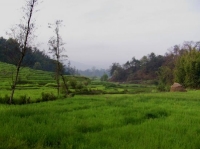There are many medical terms for digestive problems, but the fundamental cause of all of them is directly related to abnormal functioning of Agni. Agni is defined as the digestive fire, the heat producing physical element present in the alimentary system that is responsible for cooking the foods we eat.  For digestion to function properly, the digestive fire should be regular in both amount and activity. Problems with the digestive fire are the root cause for most alimentary system diseases. In addition, the toxins (ama) producted by digestive problems can be causative factors in many other diseases. For example, the acid toxins produced from undigested greasy foods can be a cause of rheumatoid arthritis.
For digestion to function properly, the digestive fire should be regular in both amount and activity. Problems with the digestive fire are the root cause for most alimentary system diseases. In addition, the toxins (ama) producted by digestive problems can be causative factors in many other diseases. For example, the acid toxins produced from undigested greasy foods can be a cause of rheumatoid arthritis.
Some basic standard compounds used for digestive fire problems are:
- For irregular digestive fire (visamagni): Trikaturasayana vati, 2 pills twice daily
- For overactive digestive fire (tiksnagni): Avipattikara churna, 1-2 grams twice daily
- For sluggish digestive fire (mandagni): Pippalyadi churna, 1-2 grams twice daily
Aruchi (Loss of appetite / Anorexia)
Aruchi is loss of appetite, and is divided into five categories by Ayurveda: Aruchi with the character of Vata, Pitta, Kapha, Sannipata and Aghantuja.
Vataja Aruchi
The loss of appetite with the character of Vata is detected by the presence of an astringent taste in the mouth. It is treated with digestive, appetizing remedies that are sweet, sour and salty in taste. Bitter taste should be avoided. Choose sweet and sour remedies from the list of digestive remedies. Salts can be added for added benefit. Enema therapy (vasti karma) can also be helpful.
Pittaja Aruchi
Loss of appetite with Pitta character causes a bitter taste in the mouth. It is treated with appetizing remedies that are sweet, bitter and astringent in taste. Purgation therapy (virechana karma) can also be helpful.
Kaphaja Aruchi
Loss of appetite with the character of Kapha causes a sweet taste in the mouth. It is treated with appetizing remedies that are bitter, pungent and astringent in taste. Sweet tastes should be avoided. Emetic therapy (vamana karma) can also be helpful.
Sannipataja Aruchi
Loss of appetite with Sannipata character causes miscellaneous abnormal tastes in the mouth. It is treated with compounds of various appetizing herbs. In this case putting the patients into a situation with pleasant surroundings is very important.
Aghantuja loss of appetite
Aghantuja loss of appetite is caused by fear, shock, anger, bad smells, bad tastes and unpleasant atmosphere. It is treated by presentation of tempting and delicious food, appetizing fermented beverages, and living in pleasant, clean surroundings.
Ajirnam (Indigestion)
 Ajirnam is correlated with indigestion, and is classified into four categories: Ama, Vidagdha, Vistambha and Rasashesa. There are many general medicines used to strengthen digestion. A specific medicine to improve digestion is the standard compound Dhanyapanchakam, 1-2 grams given with warm water twice daily.
Ajirnam is correlated with indigestion, and is classified into four categories: Ama, Vidagdha, Vistambha and Rasashesa. There are many general medicines used to strengthen digestion. A specific medicine to improve digestion is the standard compound Dhanyapanchakam, 1-2 grams given with warm water twice daily.
Amaja Ajirnam
Indigestion caused by Amagirna (undigested greasy foods) is related to Kapha. Symptoms include a heavy feeling in the stomach, nausea, puffiness under the eye and cheaks, belching with sweet taste and/or the same taste as the previous meal. It is treated with Kapha treatments along with digestive remedies. Fasting from food and taking lime juice with salt is helpful. Hingwastak churnam taken in doses of 1-2 grams twice daily can also help to resolve amaja indigestion.
Vidagdha Ajirnam
Indigestion in the form of Vidagdha is concerned with Pitta imbalance. Symptoms include burning sensation in the stomach, sour-tasting reflux, dizziness, and thirst. When neglected this condition gives rise to Amlapittam (gastritis). It is treated with Pitta treatments along with digestive remedies. One useful remedy is Pippalyadi churna, taken in doses of 1-2 grams twice daily with food.
Vistambha Ajirnam
Indigestion in the form of Vistambha is caused by Vata. Symptoms include colicky pain, bloating, constipation, and discomfort. Vata treatments are used along with digestive remedies. Salty-tasting medicines are useful. Heavy, greasy and cold foods should be avoided.
Rasashesa Ajirnam
Indigestion in the form of Rasashesa is concerned with inactive stomach function. Symptoms include weakness and fatigue, loose stool, nausea, body ache, and a cold feeling. It is treated with laxative and digestive remedies. Cold, watery foods such as melon, cucumber and banana should be strictly avoided.
Additional headings in this chapter*
Vilambika (Achlorhydria)
Chardi (Vomiting)
Amlapittam (Gastritis And Gastric Ulcer)
Parinamashulam (Duodenal Ulcer)
Annadravashulam (Peptic Ulcer)
Vibandha (Constipation)
Anaha (Tympanites)
Udavarta (Reversed Function Of The Digestive Tract)
Shulam (Abdominal Colic)
Tuni And Pratuni (Irritable Bowel Syndrome)
Atisara (Diarrhea)
Jwaratisara (Gastroenteritis)
Pravahika (Amebic Dysentery)
Raktatisara (Proctitis)
Visuchika (Cholera)
Krimi (Parasites)
Grahani (Chronic Diarrhea/Sprue)
Arsha (Hemorrhoid)
Gudabhramsha (Prolapse Of The Anus)
Sanniruddhaguda (Stricture Of The Anus)
Vidradhi (Abscess)
Dukshijavidradhi (Appendicitis)
Baddhagudodara (Intestinal Obstruction)
Chhidrodara (Perforation Of The Intestine)
Udararoga (Peritonitis)
Jalodara (Ascites)
Antravriddhi (Hernia)
Gulma (Abdominal Tumor)
*To acquire the complete contents of “Ayurveda In Nepal: The Bajracharya Samhita” please click here.
0 Responses to “Diseases of the Digestive System (Annavahasrota Roga)”